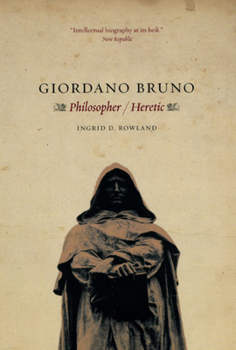Giordano Bruno: Philosopher / Heretic
Select Format
Select Condition 
Book Overview
Giordano Bruno (1548-1600) is one of the great figures of early modern Europe, and one of the least understood. Ingrid D. Rowland's biography establishes him once and for all as a peer of Erasmus, Shakespeare, and Galileo-a thinker whose vision of the world prefigures ours.
Writing with great verve and erudition, Rowland traces Bruno's wanderings through a sixteenth-century Europe where every certainty of religion and philosophy has been called into question, and reveals how he valiantly defended his ideas to the very end, when he was burned at the stake as a heretic on Rome's Campo de' Fiori."A loving and thoughtful account of Bruno's] life and thought, satires and sonnets, dialogues and lesson plans, vagabond days and star-spangled nights. . . . Ingrid D. Rowland has her reasons for preferring Bruno to Copernicus, Tycho Brahe, Johannes Kepler, even Galileo and Leonardo, and they're good ones."-John Leonard, Harper's "Whatever else Bruno was, he was wild-minded and extreme, and Rowland communicates this, together with a sense of the excitement that his ideas gave him. . . . It's that feeling for the explosiveness of the period, and Rowland's] admiration of Bruno for participating in it-indeed, dying for it-that is the central and most cherishable quality of the biography."-Joan Acocella, New Yorker "Rowland tells this great story in moving, vivid prose, concentrating as much on Bruno's thought as on his life. . . . His restless mind, as she makes clear, not only explored but transformed the heavens."-Anthony Grafton, New York Review of Books " Bruno] seems to have been an unclassifiable mixture of foul-mouthed Neapolitan mountebank, loquacious poet, religious reformer, scholastic philosopher, and slightly wacky astronomer."-Anthony Gottlieb, New York Times Book Review "A marvelous feat of scholarship. . . . This is intellectual biography at its best."-Peter N. Miller, New Republic "An excellent starting point for anyone who wants to rediscover the historical figure concealed beneath the cowl on Campo de' Fiori."-Paula Findlen, Nation
Format:Paperback
Language:English
ISBN:0226730247
ISBN13:9780226730240
Release Date:September 2009
Publisher:University of Chicago Press
Length:352 Pages
Weight:1.08 lbs.
Dimensions:0.7" x 5.9" x 8.9"
Customer Reviews
1 rating
Misinformation and fantasy
Published by Caoimhin P Connell , 2 months ago
If you are looking for an historically objective, authoritative, scholarly discussion of Giordano Bruno along the lines of Frances Yates, this isn't it. While Rowland's book is not as ridiculous as the hate-fueled religious bigotry of Alberto Martinez's book "Burned Alive" nor as patently brain-dead as Michael White's "The Pope and the Heretic," Rowland nevertheless provides a book along the lines of Domenico Berti, wherein a fictional person and myth is created from the ashes of an obscure, wandering, magical charlatan and that myth is based on the author's fantasy and not fact.
From Rowland, we learn for example that Bruno was a trained Inquisitor; we learn that Protestant churches were vibrant and thriving in northern Italy hundreds of years before there was such thing as a "Protestant." We learn that the Catholic Church was terrified of Bruno and that Saint Bellarmine lacked the intellectual skills necessary to develop a suitable rational argument to convince the philosophically superior Bruno of the "correct" cosmological and theological truth. We learn that The Catholic Church has long since accepted Bruno's cosmological model for being correct. We learn a lot of things – none of which are true of course, but apparently they make for fascinating reading for the more credulous members of the public who really just want to find some kind of justification to hate The Church, and they don't really care where they get it.
Life is short. Read good books. In my opinion, this one was a waste of money and time and merely contributes to myth and misinformation.






